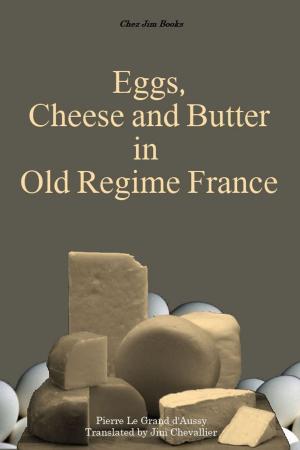Bread, Pastry and Sweets in Old Regime France
Nonfiction, Food & Drink, Baking & Desserts, Confectionary, Pastry, Bread| Author: | Pierre Jean-Baptiste Le Grand d'Aussy, Jim Chevallier | ISBN: | 1230000274415 |
| Publisher: | Chez Jim | Publication: | October 15, 2014 |
| Imprint: | Chez Jim | Language: | English |
| Author: | Pierre Jean-Baptiste Le Grand d'Aussy, Jim Chevallier |
| ISBN: | 1230000274415 |
| Publisher: | Chez Jim |
| Publication: | October 15, 2014 |
| Imprint: | Chez Jim |
| Language: | English |
Le Grand d'Aussy traces French bread history from the first Tameliers and Fourniers to the Boulangers whose bread evolved from a simple boule to the pains mollet of the seventeenth century and the long breads which already began to replace round breads in the eighteenth century. Along the way he looks at the different types of bread, typically made from wheat, and also the other grains and even other products which were used to make bread.
He then presents the history of French pastry, which began, essentially, as meat pies and other foods cooked in pastry before evolving into a dizzying array of tarts, wafers, nieules, ratons, cassemuseaux, flans, rissoles, beignets, marzipan and other treats.
This leads naturally enough into the subject of sweets, of various spices and fruits preserved in sugar and honey, sweet pastes, nougat, macaroons and other treats sometimes eaten after dinner and sometimes all through the day.
Along the way, as always, Le Grand draws in a rich variety of older sources, studding his inventories of facts with colorful anecdotes. The result is itself a rich box of tasty treats.
Le Grand d'Aussy traces French bread history from the first Tameliers and Fourniers to the Boulangers whose bread evolved from a simple boule to the pains mollet of the seventeenth century and the long breads which already began to replace round breads in the eighteenth century. Along the way he looks at the different types of bread, typically made from wheat, and also the other grains and even other products which were used to make bread.
He then presents the history of French pastry, which began, essentially, as meat pies and other foods cooked in pastry before evolving into a dizzying array of tarts, wafers, nieules, ratons, cassemuseaux, flans, rissoles, beignets, marzipan and other treats.
This leads naturally enough into the subject of sweets, of various spices and fruits preserved in sugar and honey, sweet pastes, nougat, macaroons and other treats sometimes eaten after dinner and sometimes all through the day.
Along the way, as always, Le Grand draws in a rich variety of older sources, studding his inventories of facts with colorful anecdotes. The result is itself a rich box of tasty treats.















